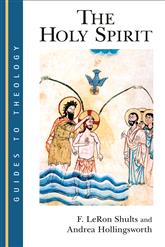LeRon Shults and Andrea Hollingsworth: The Holy Spirit
 F. LeRon Shults and Andrea Hollingsworth, The Holy Spirit (Grand Rapids: Eerdmans, 2008), 150 pages, ISBN 9780802824646.
F. LeRon Shults and Andrea Hollingsworth, The Holy Spirit (Grand Rapids: Eerdmans, 2008), 150 pages, ISBN 9780802824646.
This book makes a significant contribution to the “Eerdmans Guides to Theology” series and helps us understand the place of the Holy Spirit in the faith and practice of the church over the centuries and today. This book by Shults and Hollingsworth does this in a compact (150 pages) and accessible way.
F. LeRon Shults is a Reformed theologian committed to the belief that the church must ever be reforming. Once professor of theology at Bethel Theological Seminary he is now professor of theology and philosophy at the University of Agder in Norway. He has written a number of other books, including Reforming the Doctrine of God and Reforming Theological Anthropology (both Eerdmans).
Andrea Hollingsworth is a Ph.D. student in constructive theology at Loyola University Chicago. Her research interests include spirituality and pneumatology, and she has published book reviews and essays in journals, including Pneuma: The Journal of the Society for Pentecostal Studies.
The authors see pneumatology as “the attempt to interpret the transforming experience of the Spirit” (p. 2). And this is “implicitly or explicitly, always…within the context of trinitarian discourse” (p. 6). In the introduction we are given a succinct, refreshing account of Scripture’s witness to the Spirit. From there we move to some highlights of the church’s witness to the Spirit up to the present day.
The church has often sought to defend and promote the faith in a philosophical context, but philosophy has often not been kind to a biblical understanding of spirit. The dualism of Middle Platonism and neo-Platonic philosophy defined spirit in a way that devalued matter. This meant that the teachings of the healing of the body—even the incarnation itself—were in danger of being undermined or denied altogether. The church fathers sought to undo this influence in the Councils of Nicaea (325 A.D.) and Constantinople (381 A.D.). The focus was primarily on Christ as being one person undivided with two natures and speaking of God as Trinity, one God in three persons. Constantinople significantly added to the Creed what had developed from the Cappadocians’ theological work on the church’s understanding of the Spirit.
Augustine of Hippo’s work and analogy of Trinity as Father-memory, Son-intellect, and Spirit-will, along with Boethius’ definition of person as “an individual substance of rational nature” (p. 91) had a profound impact on Western theology in particular. In this formulation, substance had priority over being “in relation.” The Western filioque addition to the recitation of the Nicene Creed, “from the Son,” in describing the procession of the Spirit (influenced by Augustine’s writings), contributed to the eventual split between the East and the West of Christianity. The Eastern Church saw the Father as the eternal source or fountain of the Son and the Spirit, while the Western Church insisted on the Spirit’s procession from both the Father and the Son. But there have been some breakthroughs in recent times toward resolving this impasse.
Category: Pneuma Review, Spirit, Summer 2009


